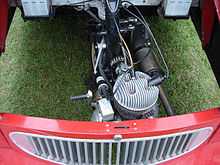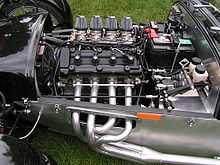Bike-engined car


A bike-engined car is a small or light weight car that is powered by an engine that was designed for use in a motorcycle. The advantage for car builders is that small car engines in high states of tune are relatively rare whereas large motorcycle engines are frequently designed for high specific outputs. The drawbacks of using bike engines in cars is the lack of reverse gear, lack of low end torque (both characteristics making parking difficult) and that the engines get a short lifespan since they have to pull more weight than they were designed for. Most of these cars use the sequential gearbox from the motorcycle, allowing for faster shifting than a traditional automotive gearbox.
Early examples include the Bond Minicar from 1949 which used a 122 cc Villiers motorcycle engine. More recently, conversions of small cars such as the Mini have started to emerge, since conversion kits have become more available. Bike-engined cars are often based around the Lotus 7-type kit cars, such as the Westfield Megabusa.
The 750 Motor Club in the UK runs a national race series for cars powered by road going motorcycle engines (RGB series) as well as Radical Sportscars, who has its own series and in the United States, the Lites 2 category of IMSA Prototype Lites[1] (formerly IMSA Lites) consists of cars using exclusively the engine from a Kawasaki ZX-10R. One of the most notable series of them all, in a worldwide scale for such is the Formula BMW single seater series for young drivers taking their next step toward Formula One.
Common modern bike engines used in cars
- Honda Fireblade
- Honda CBR1100XX
- Kawasaki ZX-12R
- Suzuki GSX-R1000
- Suzuki GSX1300R Hayabusa
- Yamaha YZF-R1
List of production cars with motorcycle engines
- AC Petite
- Berkeley T60, T60/4, B65
- BMW 600
- BMW 700
- Bond Minicar
- Fairthorpe
- Frisky
- Heinkel Kabine
- Honda Z (1970)
- Isetta
- Morgan three-wheeler
- Opperman
- Peel P50
- Peel Trident
- Piaggio Ape
- Scootacar
- Tourette
- Velorex Oskar
Non-production motorcycle-engined cars
See also
References
- ↑ http://www.imsa-lites.com/2009/lites/bulletins/IMSA%20Lites2%20Tech%20Regs%202009.pdf
- ↑ American Suzuki Motor Corporation (January 4, 2002), Suzuki Shows Part Car, Part Motorcycle Concept And Race Vehicles At Los Angeles Auto Show (press release), retrieved 2009-11-10